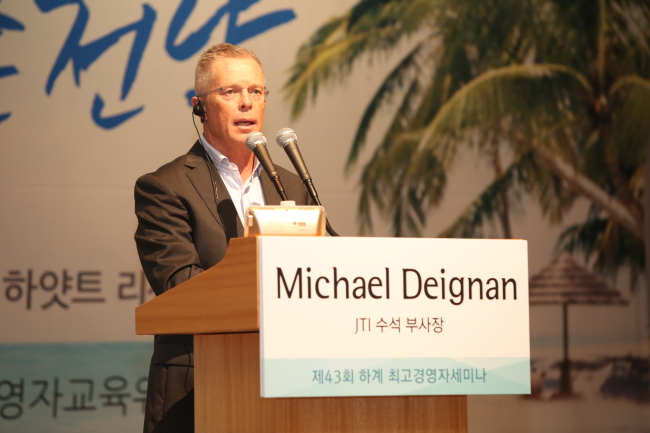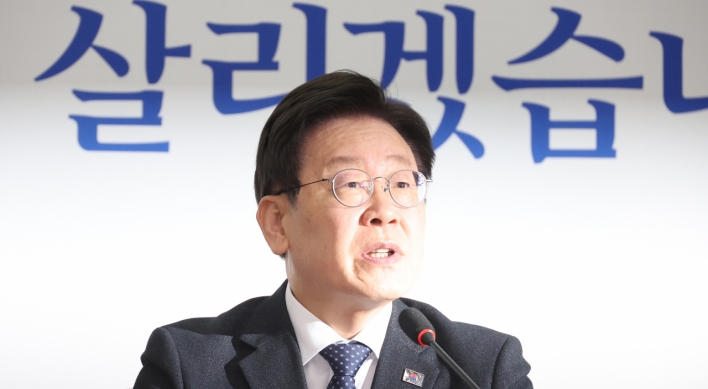Tobacco regulations are the beginning of ‘slippery slope’: JTI executive
By Won Ho-jungPublished : July 25, 2017 - 16:47
Regulations that restrict packaging and other marketing by tobacco manufacturers are spilling over into other sectors creating a “slippery slope,” an executive of a global cigarette company has claimed.
“At the extreme end of the slippery slope is plain packaging that removes all brand imagery, which will have major ramifications for other consumer goods industries, because the measure could be extended to any product under increased regulatory scrutiny,” said Michael Deignan, vice president of corporate affairs and communication at Japan Tobacco International’s Asia-Pacific division, in an interview with The Korea Herald.
Plain tobacco packaging refers to homogenous packaging that removes all brand imagery.
This slippery slope was the topic of a speech titled “Beware! Global Regulatory Trends Undermining the Future of Brands” that Deignan gave at the 43rd KMA CEO Summer Seminar on Tuesday at The Shilla Jeju.
The tobacco industry is often targeted worldwide by regulations that put roadblocks on brand marketing. In Korea, for example, tobacco makers are required to place pictorial warning labels on all cigarette packs that show the potential risks associated with smoking.
Deignan said that these types of regulations may eventually lead to plain packaging, which eliminates differentiation among brands and distorts the market. Even more important is the fact that these restrictions are spilling over to other products that are considered unhealthy, such as alcohol or junk food.
“At the extreme end of the slippery slope is plain packaging that removes all brand imagery, which will have major ramifications for other consumer goods industries, because the measure could be extended to any product under increased regulatory scrutiny,” said Michael Deignan, vice president of corporate affairs and communication at Japan Tobacco International’s Asia-Pacific division, in an interview with The Korea Herald.
Plain tobacco packaging refers to homogenous packaging that removes all brand imagery.
This slippery slope was the topic of a speech titled “Beware! Global Regulatory Trends Undermining the Future of Brands” that Deignan gave at the 43rd KMA CEO Summer Seminar on Tuesday at The Shilla Jeju.
The tobacco industry is often targeted worldwide by regulations that put roadblocks on brand marketing. In Korea, for example, tobacco makers are required to place pictorial warning labels on all cigarette packs that show the potential risks associated with smoking.
Deignan said that these types of regulations may eventually lead to plain packaging, which eliminates differentiation among brands and distorts the market. Even more important is the fact that these restrictions are spilling over to other products that are considered unhealthy, such as alcohol or junk food.

“The World Health Organization considers tobacco use, physical inactivity, an unhealthy diet and the abuse of alcohol as key determinants for the spread of non-communicable diseases and is coming up with numerous regulations to tackle these lifestyle related diseases based on its approach to tobacco,” said Deignan, who described the spillover effect as “copy-pasting” tobacco regulations to other industries.
“Regulators are looking to hit food and drink companies with the same punitive taxes, pictorial health warnings and even plain packaging, whether it’s a bottle of wine, a chocolate bar or a fizzy drink.”
Plain packaging for tobacco products was implemented in Australia in December 2012, an experiment that Deignan describes as a “failure” that demonstrates the danger of the slippery slope. Without brand differentiation, consumers will base purchasing decisions on the cheaper product, leading to a race to the bottom. Plain packaging also makes it more difficult for consumers to differentiate between authorized products and illegal products, he said.
“The data suggests that down trading (in the Australian tobacco market) has been most significant in the last few years, dramatically reducing the margins for all in the supply chain. In parallel to down trading, the level of illegal tobacco consumption has increased by 21 percent after the policy was introduced, as estimated by KPMG.”
Within the tobacco industry, Deignan says that increasing regulation can hurt both national coffers that bring in less tax revenues from legitimate tobacco sales as well as the retail tobacco industry that must face a value-driven consumer market. These detrimental effects may extend beyond the tobacco industry if regulations continue to expand.
“If one industry is deprived of its intellectual property, all trademark owners will lose,” he said.
“Some companies and industry bodies are already voicing their opposition to the slippery slope of naïve, chaotic and ill-considered regulations and we are hoping that more concerned organizations will join the debate.”
By Won Ho-jung (hjwon@heraldcorp.com)




![[Herald Interview] 'Amid aging population, Korea to invite more young professionals from overseas'](http://res.heraldm.com/phpwas/restmb_idxmake.php?idx=644&simg=/content/image/2024/04/24/20240424050844_0.jpg&u=20240424200058)






![[Hello India] Hyundai Motor vows to boost 'clean mobility' in India](http://res.heraldm.com/phpwas/restmb_idxmake.php?idx=644&simg=/content/image/2024/04/25/20240425050672_0.jpg&u=)






![[Today’s K-pop] NewJeans' single teasers release amid intrigue](http://res.heraldm.com/phpwas/restmb_idxmake.php?idx=642&simg=/content/image/2024/04/26/20240426050575_0.jpg&u=)